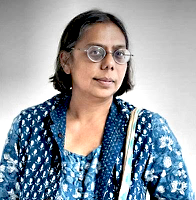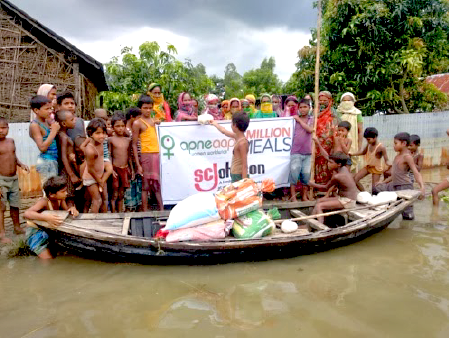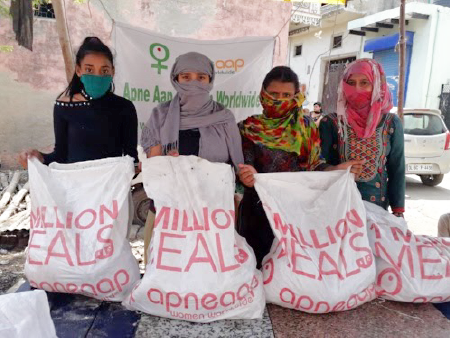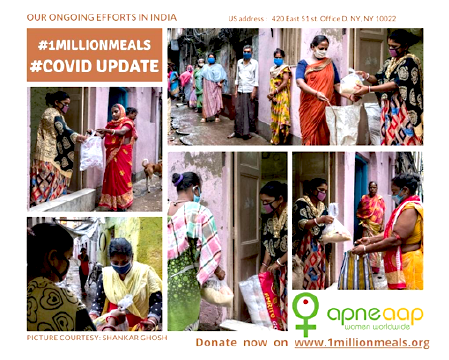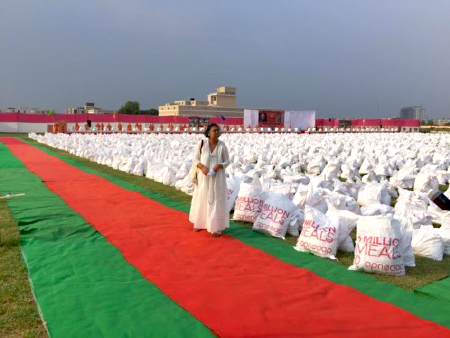Real Life Stories: People Trafficking in India (Apne Aap)
The latest in our series of interviews with specialists and those working in the field of trafficking is with Ruchira Gupta is the Founder and President of Apne Aap Women Worldwide and Apne Aap International, a partner organisation with Liluye. She is a social justice activist, feminist campaigner and journalist. She is also a professor at New York University and a distinguished scholar at the University of California, Berkeley.
Liluye’s staff writer, Emma Lees, interviewed Ruchira to find out more about her work with those that are trafficked and at risk, particularly during the COVID-19 pandemic.
Why did you get started in the work you are doing?
I launched 1MillionMeals.org as a COVID crisis campaign for my NGO, Apne Aap, for excluded women and children in India in March 2020. This was after I got a desperate WhatsApp message from a girl sent home from school. She was in the red-light area with her mother and they had no food. This was three days into the lockdown. I decided right then to put 500 cooked meals into the trunk of my car and took it to her community. Then, I began to get similar S.O.S. messages from all over India, so I scaled up my efforts and am now ensuring food, medicine, hospital and vaccination referrals to more than 50,000 excluded women and children.
While COVID-19 has been tough on everyone, it has been particularly disastrous for victims of sex-trafficking and their children, many of whom were already barely making ends meet. They have lost lives, livelihoods and access to food. More than 85% report that their housing is at risk. Children are often sent back from school and have no way of accessing online education. Food and fresh air is a luxury; let alone WIFI and computers.
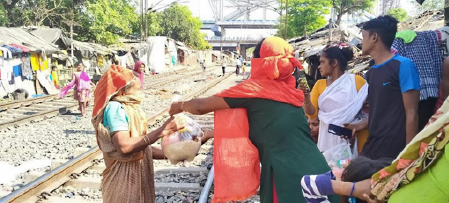
How did your work all start?
The reason that the women and children were able to find me, lies in a moment in my life two decades ago.
I was a journalist when I stumbled upon rows of villages with missing girls in Nepal in the early 2000s. As I investigated, I found that a sex-trafficking chain operated from the villages of Nepal to the brothels of Mumbai (India). I ended up making a documentary called “The Selling of Innocents,” for which I won an Emmy. I decided to help the women who had told their stories in my film by setting up an NGO called Apne Aap with the mission to end sex-trafficking.
First, I began by hiring a teacher for the children of the 22 prostituted women who had saved me. These children are now young adults with jobs as animation artists, chefs, managers, etc.
Apne Aap has grown to help 20,000 women and children all over India. We have helped support more than a thousand women and children to graduate from school and college, and break the cycle of inter-generational prostitution among nomadic groups trapped in inter-generational prostitution.
Now, as the COVID crisis stalks India, we are faced with a tragedy of immense proportions. I may lose the children I was educating to sex predators again, as they (the sex predators) offer food or medicine in return for sex.
What are your specific mission and goals that keep you motivated?
My vision is to create a world in which no human being is bought or sold. My goal is to end sex-trafficking through legal and policy change AND at the same time help individual victims of sex-trafficking, girl by girl.
I am influenced by Gandhi who believes that the yardstick of change must be the positive impact on the weakest person we know. To me, ‘she’ is the 15 year old in a brothel. I call her ‘The Last Girl.’ I truly believe that change must begin at the bottom and transform the top. That is why I work with the vulnerable and United Nations (UN).
I am a professor at the New York University and I sit on various boards and committees of the UN and other international organizations so that I can amplify the voices of the most excluded. This is my agenda. I helped in the passage of the UN Protocol, U.S. law, and also the Indian law on trafficking, but I always remember that my understanding came from the survivors of prostitution.
I still love writing and storytelling, but now I try to do it from the point of view of ‘The Last Girl’ – the most vulnerable human being I know – who is vulnerable because she is a poor, female and a low-caste teenager. Traffickers can prey on her hunger and homelessness.
Do you think that there is more awareness around trafficking currently and how do you think it can be more widely discussed?
Yes, of course. Now at least 140 countries understand the link between prostitution and trafficking and have created laws to punish the traffickers and help the victims. There are foundations, budgets, and university courses on the subject. Also survivor groups have formed and are speaking up now.
How do you think human, sex trafficking can be eradicated?
Girl by girl, and law by law. We need to confront the demand for prostituted sex by punishing those who buy and sell human bodies for sex and cheap labour. We need to change the culture so sex is based on equality and not domination.
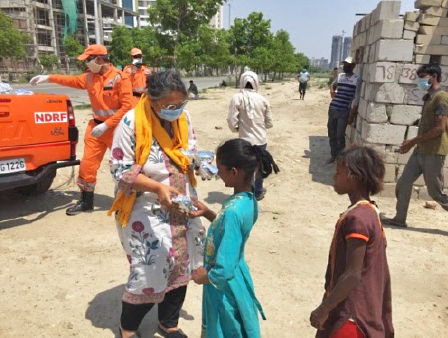
What can individuals and organisations do to help end trafficking?
They can fund organisations doing the actual work of putting traffickers in jail, helping women leave situations where they have been trafficked, preventing girls from being prostituted, and advocating for changing laws to shift the blame from the victim to the perpetrator.
What is your primary goal or campaign right now?
My main goal is to provide food and essentials to victims of sex-trafficking and their children during the COVID crisis so that they are not forced to sell their children due to disease or death caused by COVID.
For more information about 1MillionMeals.org, please watch this six-minute video:
What is your most memorable achievement?
It changes with every girl who succeeds. Today, it is a beautiful song that a girl I am sponsoring in school sent to me. Yesterday, it was a link to a YouTube channel created by a survivor of prostitution whom I have helped for nearly two decades.
Right now, it is the knowledge that in the COVID pandemic I could provide millions of meals to a thousand women and children across India, in spite of the breakdown of all logistics.
So far, during the COVID crisis, these are some of our collective achievements and contributions:
• To provide food and oxygen with dignity.
• Our COVID crisis effort, #1MillionMeals, ensures food, medicine, vaccinations and hospital referrals during the deadly India COVID-19 second wave.
• For children, we have found safe housing, computers and WIFI.
• We have provided support to 57,739 women and children in red-light areas, migrant slums and refugee camps with millions of Dignity Kits.
So far, we have donated to those in need:
• Meals: 6,700,500
• Beneficiaries: 67,005
• Kits: 67,005
• Sanitary pads: 338,770
To find out more about Ruchira’s work with 1 Million Meals and Apne Aap:
• 1 Million Meals.org
• Meet the woman providing millions of meals to sex workers and their families amid coronavirus
• How a WhatsApp message laid the foundations for the 1 million meals campaign
Apne Aap works both pre and during the pandemic with trafficking survivors or those at risk. One in every 250 girls and women have been trafficked for sex in our world today. They are ‘The Last Girls’ – the most vulnerable of human beings. Apne Aap aims to change that.
Find out more about Apne Aap in this three minute video:
https://youtu.be/kUItNkvjD-g
Thank you so much for your time today and all the work that you and your organisations do.
Thank you.
Ruchira was interviewed by Liluye Staff Writer, Emma Lees, who also writes on her blog, InnerExpat.

